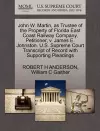
John W. Martin, as Trustee of the Property of Florida East Coast Railway Company, Petitioner, V. James E. Johnston. U.S. Supreme Court Transcript of Record with Supporting Pleadings
2 authors - Paperback
£17.99
Francis Wells is a recognized leader in the field of mitral and tricuspid valve surgery. He lectures on the subject internationally and has published numerous articles on the topic. He initially trained in London and the United States, before moving to Papworth Hospital as a consultant cardiothoracic surgeon in 1985. His specialist area of cardiac surgical interest is the management of all forms of heart valve disease, especially mitral valve reconstruction. Mr Wells has a large experience over 37 years of practice. The functionality of the valve has always been a prime interest for him, rather than simply achieving competence often at the expense of normal physiology. This has led to a desire for a deeper understanding of the basic sciences related to the valve and hence the generation of this book. He also has an interest in all aspects of adult cardiac surgery with 25 years experience in cardio-pulmonary transplantation, directing the lung transplant unit at Royal Papworth hospital for 20 years. Mr Wells also ran a full thoracic and Oesophagela practice specialising in surgical oncological management. He was instrumental in setting up the first two stop lung cancer centre in the United Kingdom.
Robert H. Anderson studied medicine at the University of Manchester. He then returned to the Department of Anatomy, having completed his clinical residency appointments. He was offered the chance to continue his researches on cardiac innervation, concentrating on the conduction tissues which led to the chance to collaborate with surgical colleagues in Liverpool, and with electrophysiologists and pathologists in Amsterdam. Having spent a year in Amsterdam, he was then offered the chance to work as clinical anatomist at the Royal Brompton Hospital in London. This appointment was supported by the Joseph Levy Foundation, in collaboration with the British Heart Foundation. The support from both Foundations then continued throughout the remainder of his active career. This was undertaken from 1974 until 1999 at the Royal Brompton, and subsequently, until 2007, at Great Ormond Street Children’s Hospital. Throughout these periods, all his studies had been directed towards clinicians, with the aim of stimulating surgical techniques, improving the management of children born with congenital heart defects, and contributing to the understanding of the various fields of diagnosis.
On his retirement in 2007, he was made Emeritus Professor at University College, London. He remains deeply involved in collaborative research ventures. Using episcopic microscopy and molecular biological techniques, he has been able to follow the fate of tissues, and thus to trace the development of the normal, and the maldevelopment of the abnormal, heart. To this end, he has received Professorial Fellowships at the Biosciences Institute, Newcastle University; and at St George’s Medical University in London. He also remains active in both teaching and research as Visiting Consultant at Birmingham Children’s Hospital.